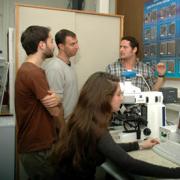Why Materials Science and Engineering?
Do you want to understand what caused the Titanic disaster? Why diamond properties are so different from those of graphite, although both are made of carbon? How Uri Geller's spoons bend themselves? How to create translucent concrete? What materials are used to make a space shuttle? How trains can hover over tracks? How to design high energy capacity batteries of the future? How to create human body tissues from synthetic materials? How to improve the functionality of human body implants? Do you want to invent new material technologies that will lead to revolutions in the 21st century? If yes, you belong with us!
Materials Science and Engineering is a field which deals with the relationship between preparation methods, structure, properties, and applications of materials, including metals, polymers, ceramics, composites, semiconductors and biomaterials.
The study of materials is the oldest field of science and technology. The effect of materials on human development is reflected in the catalog of different developmental stages in history, which carry the name of materials (Stone Age, Copper Age, Bronze Age, and Iron Age) .
In recent years, this area has become broader, and it now spans many different industries, since the development of materials has become a bottleneck in the creation of new technologies and new industries. Modern society depends largely on advanced materials, such as those used in aviation turbine engines and in other vehicles, in systems for energy production and storage, in optical fiber communication, and in miniature components for electronics and biomedical applications. The field of materials is likely to be one of the key areas in the next technological revolutions, which will include interfaces with nanotechnologies and bio-informatics. This field will be a growth engine for the global economy, with important effects on quality of life, health, safety, and the environment.
A report published by Thomson Reuters in 2011 indicates interest in materials by most of the world economies. Advanced materials are currently defined as an Enabling Technology, one of the four areas that drive breakthroughs in the industry and culture. The EU is allocating research funds dedicated to the materials following these arguments:
"Alongside biotechnology and information technology, materials science and engineering is one of the most important areas of R&D in industrialized countries. It has fuelled progress in every industrial sector from transport to nanotechnology. Intelligent, embedded sensors and highly durable light structures, for example, are both successful products of material research."
The need for material engineers is expected to increase steadily, both in industry and in government and security. Materials engineers will be required in design, research, development, production, quality control, maintenance, failure analysis, technology management, teaching, etc.





